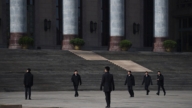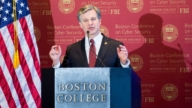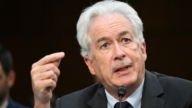【新唐人2014年10月23日訊】今年以來,中共當局接連公布了幾起涉及軍隊方面的泄密案件。中共國家主席習近平也於數日前下令,要求加緊對軍隊信息安全管控。那麼,這其中說明瞭甚麼問題呢?一起來看看。
日前,經中共國家主席習近平批准,中共中央軍委印發了《關於進一步加強軍隊信息安全工作的意見》,要求「推進信息安全集中統管」,並加快構建軍隊信息安全防護體系。
《解放軍報》在刊登這條消息時稱,這是中共對來自虛擬空間威脅做出的反應,以及有關軍隊信息安全方面的重大舉措。
美國中文雜誌《中國事務》總編輯伍凡認為,由身為中共國家主席的習近平,親自發佈這個命令,可見中共軍隊信息安全方面存在的問題非常的嚴重。而不少涉及泄密案的,其實都是中共的高官。
美國中文雜誌《中國事務》總編輯伍凡 :「以前我就聽講過,在中共的外交部有一批日本幫哎,在中國國務院裡面有一批日本幫哎,專門替日本人講話的。因為共產黨本身就是個賣國賊嘛!這些人都是共產黨的高官,包括他們的子女。」
今年以來,中共官方接連公布了多起間諜案、涉密案。
5月4號,廣東公布一起網絡竊取軍事機密案,據說有40人被策反。
8月4號,中共方面宣稱,一對加拿大籍夫婦因涉嫌竊取中共國家軍事和國防科研秘密而被審查。在報導這一消息時,大陸媒體也對泄密的中共高官、學者等進行了盤點。
8月5號,哈爾濱某大學一位在讀研究生,被指因涉嫌泄密案而被捕。
這麼多間諜、泄密案件被集中公開,這在以往並不多見。
伍凡:「包括政治、經濟、軍事、外交,各個方面都在泄密呀。中共現在高層有很多很多外國的間諜。所以共產黨基本它保不住密了,保不住了。」
事實上,中共今年也採取了一系列措施來加強。
2月,中共中央網絡安全和信息化領導小組在北京宣告成立,由習近平親自擔任組長,李克強、劉雲山任副組長。這一人員構成表明,網絡安全和信息化被提高到空前重要的地位。
3月1號,中共《保守國家秘密法實施條例》生效。
而後,中共又禁止中央機關採購和安裝Window 8操作系統、禁止採購賽門鐵克和卡巴斯基殺毒軟體、啟用IBM的高端伺服器,禁止採購蘋果手機等。
那麼,這些措施是否能有效監控網絡信息安全呢?
中國問題獨立評論員李善鑒:「說不用windows8,不用iphone,從專業角度講,它並不是一個正確的措施,而且不能解決問題。它用的所有系統,最後都是美國或者開源軟件做的事,它根本沒有可能自己去搞一個系統。如果它真的搞了個甚麼系統的話,以中國目前的水平,漏洞肯定還會更糟。可是鼓吹這些事情的人,可以冠冕堂皇的用這些方式去搞錢。」
2006年,中共也曾發出對微軟系統的明文禁令,然而當時由中共高調資助的紅旗Linux項目,最終淪落到以清算收場、員工集體討薪的地步。
對此,美國哈佛大學伯克曼網際網絡與社會中心研究員毛向輝評論說,「因為糾結於國產操作系統,滋養了一批『口號鼓吹家』和『國產操作系統企業』,他們打著國產的旗號,兜售民族產業的招牌,卻絲毫沒有任何真正底牌。」
中國問題獨立評論員李善鑒認為,中共面臨的並不是技術問題,也不是搞個甚麼法律法規就能解決的問題。
李善鑒:「中國老百姓對它都有很大的不滿,誰會全心全意的為它賣命?信仰缺失了,這些人你指望著他去給你保守秘密嗎?可能別人只要出了錢了,這個事情就會發生。」
美國《外交家》雜誌網站此前曾分析,中共除擔憂外部威脅外,也依然擔心能否對國內網絡上的內容進行有效控制。
採訪/易如 編輯/王子琦 後製/肖顏
Xi Jinping Rattled by Military Leaks
This year, the Chinese regime announced several cases
involving military leaks.
Chinese President Xi Jinping also ordered intensive management
and control to military information.
What does this mean? Let’s take a look.
Recently, approved by the Chinese President Xi Jinping,
the Chinese Communist Party (CCP) Central Military
Commission issued suggestions to:
Further Strengthen Military Information Security;
He demanded the speedy centralization of security information
and the acceleration of the construction of a military information
security protection system.
People’s Liberation Army Daily claimed that it’s a reaction to
the threat from cyber space
and major leaks of military information security from the
CCP at the time of this news report.
US Chinese magazine China Affairs editor Wu Fan believes:
the CCP military information security has serious problems
because the CCP President, Xi Jinping personally issued
this order.
And most leak cases involve CCP senior officials.
Wu Fan: “I heard there is one group of Japanolatries in the
CCP Foreign Ministry and China State Council separately to
speak to the Japanese.
Because the Communist Party itself is a traitor! These people
are Communist Party senior officials, including their children. “
This year, Chinese officials announced several espionage and
leak cases.
May 4, an Internet military leak case was announced in
Guangdong with allegedly 40 people involved in the
subversion.
August 4, CCP claimed that a Canadian couple is under
investigation on suspicion of stealing national military
information and defense research secrets.
Mainland media also checked out the CCP officials and scholars
who leaked before when reporting the news.
August 5, a graduate student at a university in Harbin was
arrested on suspicious of leaking.
It’s rare for so many spy and leak cases to hit the news all
together.
Wu Fan: “There are leaks in all aspects, including political,
economic, military, and diplomatic.
The CCP senior level has a lot of foreign spies.
So the CCP can not hold any secrets."
The CCP have taken a series of measures to strengthen
and seal up the leaks.
In February, the CCP network security and information
technology team was set up in Beijing, headed personally by
Xi Jinping.
Li Keqiang and Liu Yunshan are deputy heads.
The composition showed network security and information
technology have been raised to unprecedented importance.
March 1, the CCP Regulations for the implementation of the
law on Guarding State Secrets took effect.
Then, the CCP banned central offices from purchasing and
installing Windows 8 operating system, Symantec and Kaspersky
antivirus software by using IBM high-end servers;
They also banned Apple mobile phone.
So, will these measures effectively monitor internet security?
Chinese independent commentator Li Shanjian:
“from a professional point of view, a ban on Windows 8 and
iphone are not a proper measure and can not solve all problems.
All systems they use, are designed by US or a software
development company.
They are unable to design their own system.
Based on current standards, if they design their own system, it
might have more bugs.
However, the system development is an ulterior reason for
promoters to make money."
In 2006, the CCP also issued a decree to ban the Microsoft
system.
However, the high-profile project Red Flag Linux, funded by
the CCP, eventually ended up in liquidation and the employees collectively asked for a salary.
In this regard, the US Harvard University Berkman Center
Internet and Society researcher Isaac Mao commented:
“slogan experts and national operating system enterprises are
nourished because of national system tangle.
They have no cards but to peddle national industry design under
the name of national design.
Li Shanjian believes that the CCP’s problem is not a technical
issue or solved by law and regulations.
Li Shanjian: “Chinese people have a lot of dissatisfaction
with it. Who will devote their whole heart to serve them?
Without believe, how can you count on these people to keep
secrets for you?
Commitment will weaken when someone else gives
them money."
US Diplomacy magazine website previously analyzed, that in
addition to external threat concerns, the CCP also still worry
about whether they can control internal Internet effectively.
Interview/YiRu Edit/Wang Zhiqi Post-Production/XiaoYan

























